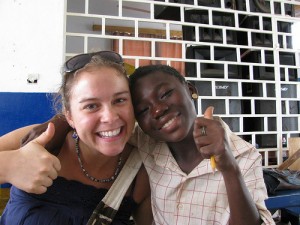
Dennis Whittle’s organization has helped Carolina alumni like Callie Brauel (pictured here) get more exposure for their worldwide do-good projects. Brauel’s ABAN, which empowers marginalized women in Ghana, has a permanent spot on GlobalGiving’s Web site,.
Editor’s note: This interview supplements an alumni profile feature on Dennis Whittle (religious studies ’83), co-founder of GlobalGiving.org and UNC’s Richards Donohoe Social Entrepreneur in Residence, published in the spring ’13 Carolina Arts & Sciences magazine.
Q: What do you think about the intersection between arts and humanities and entrepreneurship at UNC?
A: Entrepreneurship at its roots means trying to create new ways of making value in the world, and sometimes that value is purely monetary, but more and more that value is about goodness in the world. The humanities are, if nothing else, a study of goodness and ideas about what constitutes goodness. And the most exciting thing about entrepreneurship now is people trying to make the world a better place, and reflecting on things they read in their English and classics and history classes and all the other liberal arts classes — thinking about what will make the world a better place, and then going out and doing it.
Q: UNC seems to be developing a niche in social entrepreneurship. Why do you think that is so?
A: Chapel Hill has a rare sort of aggregation of people from the business school, economics, social justice at the Campus Y and the international angle through the FedEx Global Education Center, and what’s encouraging is all these people work together in a loose network that is way greater than the sum of its parts. I am seeing students who are touched by all of those, and you can really tell. Each of those [entities] has its own unique impact and footprint. And that’s pretty rare in higher education I think. It’s very difficult to work across boundaries like that, and they are making it happen.
Q: In a GlobalGiving blog series about “10 lessons in 10 years,” you said you are most proud of the team you helped to create. Tell me about that team, and why as an entrepreneur, it’s so important to surround yourself with a good team.
A: Entrepreneurship requires constantly overcoming obstacles you didn’t even know existed WHILE you’re inventing something. One of our team members described the last 10 years as rebuilding a jetliner, turning a 727 into a 747 while it is flying through the air. That means you have to invent the engine and put it on the plane while it’s flying. … This requires inventiveness and incredible teamwork. You can find really smart people who can invent individual components, but finding people who can work together is very rare. It’s very stressful and inherently involves a lot of conflict. To put together a team that can be high-functioning in that environment is like gold. …. Once you have a team like that, you can do many different things. That’s the secret sauce of GlobalGiving I think. It involves a combination of fun, hard work, intense focus and serendipitous creation.
Q: After nine years, GlobalGiving became financially sustainable. What are the chief challenges of the next decade?
A: The first 10 years were about how to create a vibrant funding marketplace. The next 10 years will be about how to create a vibrant learning marketplace — how to help organizations learn from each other to increase the impact of every dollar. There are [new] ways to reach out to people around the world so they can share knowledge and learning, and I think that will have an impact on the quality of projects.
I think our impact at GlobalGiving is about money, but it’s also about access and self-esteem. These groups can compete in a global marketplace where your size doesn’t matter.
[Interview by Kim Weaver Spurr ’88]
